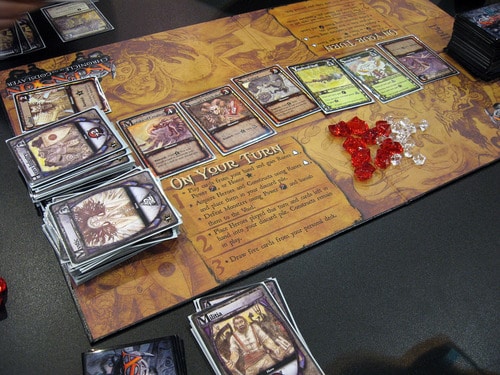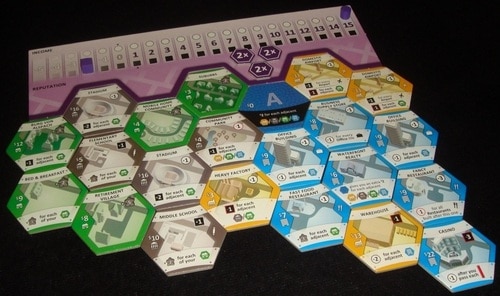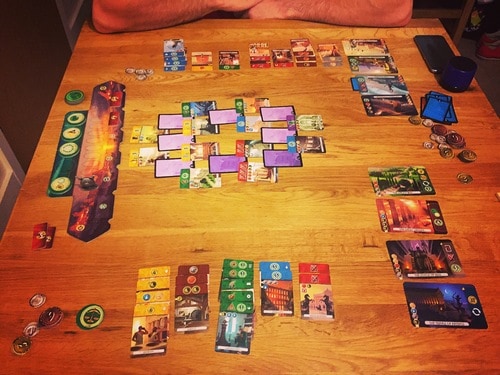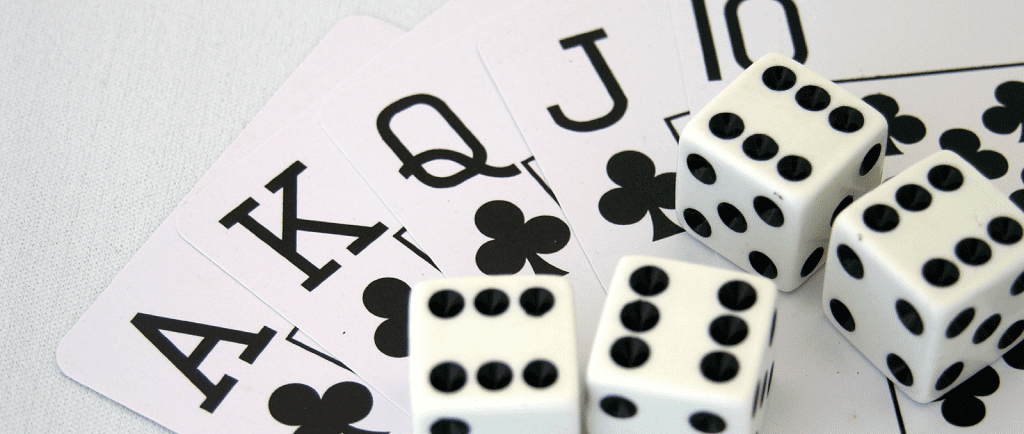
Today I continue looking at the basic elements that make up tabletop games with acquisition. In case you missed the previous articles, you can see them here: Goals, Scoring, Actions, Resources, Uncertainty, and Space and Time.
In this series on game elements, I’ve tried to investigate aspects of all, or almost all, games. I think some people have questioned some of the articles for that reason… if all games have something, like time or resources, why talk about them? In my opinion, the fact that every game you ever design will have these things is exactly why you want to carefully consider them!
Acquisition is one of those elements that is in many games, but not all. In fact, many classic games, like Chess and Hearts, feature little to no acquisition at all: players begin the game with everything they’ll ever have, and simply lose things over the course of the game.
Even though acquisition isn’t featured in all games, it is featured in many, and is extremely important for Euro games in particular. Any game that can be described as a builder, be it a deck builder, an engine builder, a tableau builder, or some other builder, will almost certainly involve the player gaining game pieces over the course of the game. So why is acquisition so prevalent?

In deck builders like Ascension, acquiring is the main focus of the game. Image from Board Game Geek.
BENEFITS OF ACQUISITION
Progression. Acquisition offers a lot of benefits for a game, but none more than a sense of progression. Players start with little and end with lots… that’s exciting! It lets players look back after a game and feel like they accomplished something.
Collecting. Acquisition also appeals to the basic human instinct to collect. People everywhere like getting new stuff, but it’s especially ingrained as something joyful in our modern consumerist culture. People just find gaining things for themselves inherently enjoyable.
Pacing. Acquisition can be used to help establish the game’s dramatic arc. Not only do players begin with little and end with a lot, but the quality and quantity of what they acquire can increase over the course of the game, building up excitement. And ending the game when all of something has been acquired can be easy to understand and create tension.
Ease into complexity. Another form of pacing is starting a game simple and making it more complex as the game progresses, which acquisition can help with greatly. Players start with little under their control, and therefore little to worry about. But over the course of the game, players will build up many possessions, so of which might interact with each other. Complexity can be fun, but it’s rarely fun to be dropped head first into it.
Differentiate players. Acquisition can also help differentiate players. In some games, this can be as simple as giving players different incentives, or it can be as intricate as giving the players the opportunity to take pride in their creations. Whatever the details, it can help players feel unique and special.

In Suburbia, players acquire tiles to create their own city, making players feel unique. Image from Board Game Geek.
Define and reward goals. Goals are another way that acquisition finds a natural fit in games. On the one side, acquiring something new and exiting is a great reward for completing a goal. On the other, acquiring a certain combination of game pieces is a great simple challenge for a goal. This gives the player a clear objective to accomplish, though depending on the game actually achieving the requirement could take many routes.
Focus player interaction. Especially in games where players compete to acquire the same things, acquisition can be central to player interaction. In fact, in many games, all player interaction revolves around players fighting to acquire the same scarce resources.
Acquisition can really contribute a lot to a gameplay experience, so it’s no surprise that it does a lot of the heavy lifting for many games these days.
DANGERS OF ACQUISITION
There are many benefits to acquisition, but there are also some downsides. Usually this has to do with balance. Acquiring possessions tends to have a snowball effect, where getting more possessions or the best possessions early tends to give a player an edge at getting even more or better stuff down the road. This can lead to games feeling decided in the first turn or two, which can be very unsatisfying.
These issues can be mitigated in many ways, such as assigning a cost to possessions or giving each player a shot at the best pickings. Some of these problems can also be addressed by tuning your game. For example, if the best possessions give the player too much of an advantage, tone down the power level of those possessions, or do not let players get them until late in the game. And if acquiring too much is a problem, make all players acquire at the same or similar rates.
HOW PLAYERS ACQUIRE
The way in which players acquire new things can have a major impact on the gameplay experience. And novel methods of acquisition can form the central fun of a game. Here are a few considerations.
Random. Randomly acquiring game pieces might sound unsatisfying, but many games employ this method, most commonly when drawing cards from a deck. What keeps randomly acquiring game pieces interesting is how players choose to use the pieces they randomly acquire.
Choice. If randomly acquiring game pieces is leaving your players unsatisfied, give them some choice. There are many ways to do this, but a couple of simple options are having a market of available pieces or allowing players to acquire pieces discarded or used by other players.
Earning. In many games, players need to pay to acquire new game pieces. In others, players must accomplish some task, be it collecting a combination of resources, defeating an enemy, moving to a specific location, or really anything. In addition to helping with balancing, earning something feels that much more satisfying than just being given something.
Competition. Many games involve players competing to acquire the same game pieces. There are countless ways to do this, but a few possibilities are players racing to acquire pieces before they’re snatched up by other players or players competing along a track to determine who is most worthy of acquiring the piece (think auctions). Players competing to acquire game pieces is often so engaging that it is the central focus of the game.

In 7 Wonders: Duel, players choose which cards to acquire, but must earn them by having the correct resources and race to them before their opponent. Image from Board Game Geek.
Collaboration. It’s not common for players to work together to acquire resources, but there are some important examples (Catan). Here, players often trade with each other to acquire new game pieces. Again, this can easily form the main focus of a game, especially because negotiation can be a time consuming activity.
Giving. Why don’t players give each other gifts in more games? In all cultures that I’m aware of, gift giving is a customary and important social phenomenon. It seems to be ubiquitous to the human experience. So where is it in games?
This is one area of design space that I think is ripe for exploration. I encourage adventurous readers to brainstorm how gift giving can be incorporated into new designs. I sincerely believe that there’s real potential for easy to understand and very satisfying gameplay that has yet to be discovered here.
WHAT PLAYERS ACQUIRE
Much like previous articles in this series, I’ve been intentionally very vague about what players acquire here. That’s because I want this analysis to be as widely applicable as possible, and I don’t want to give specific examples that might limit the reader’s imagination. Still, some readers are probably curious, so here are a few ideas about the sorts of things players might acquire during a game:
– Resources
– Additional or special actions
– Buffs to stats or improved actions
– Points or pieces that contribute to scoring
– Information
Again, these are vague, but really the sky is the limit here. I hope this gives you some ideas about what players can acquire, and in particular you realize that acquiring does not have to refer to gaining physical components.
ACQUIRING PLAYERS
Acquiring isn’t a part of every game, but it is an important part of many games, and for good reason. People find acquisition inherently enjoyable and easy to comprehend, and acquiring can serve many important structural roles for games, providing and rewarding goals, defining pacing, and creating a sense of progression and accomplishment. Acquiring can easily be the focus of a game, and certain genres, such as deck building and drafting, are all about acquiring. Even when acquiring is not a game’s focus, including it sparsely can add excitement and spice to a game. It’s always worth considering adding acquisition to any design.







